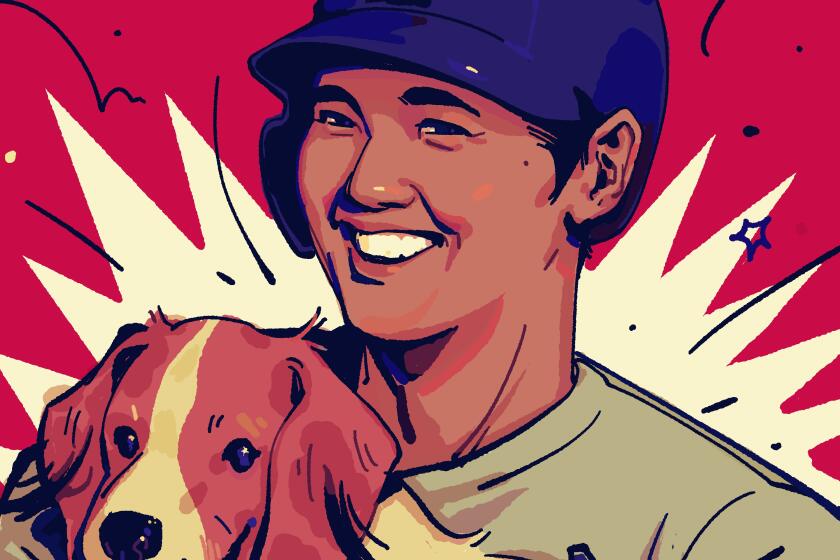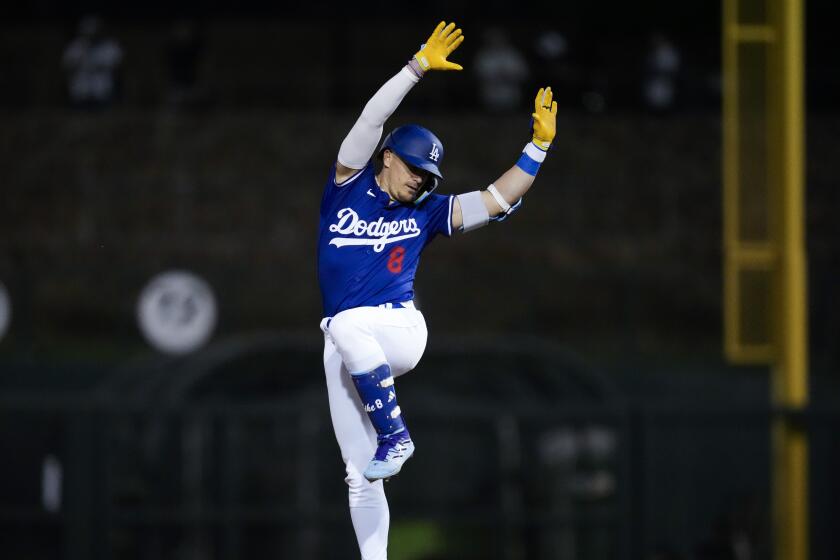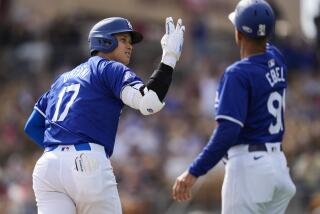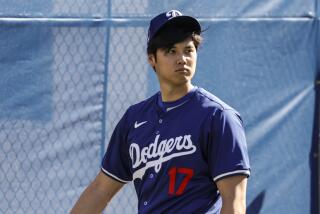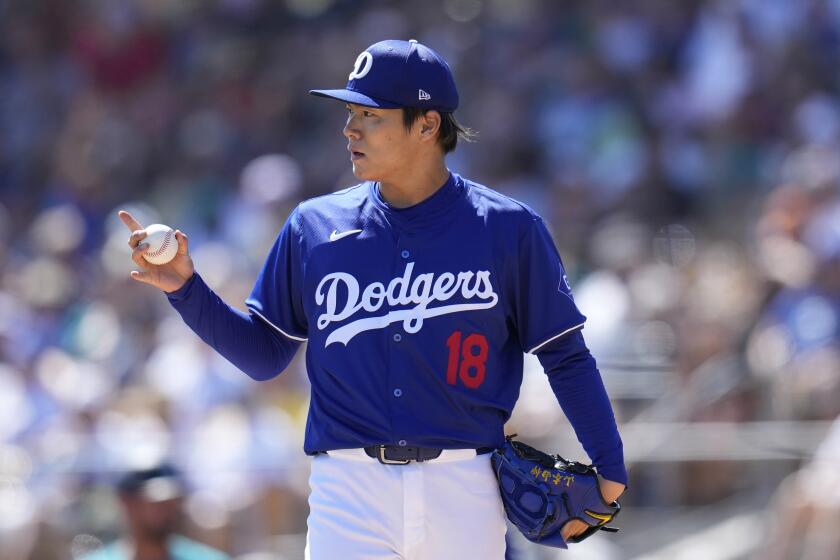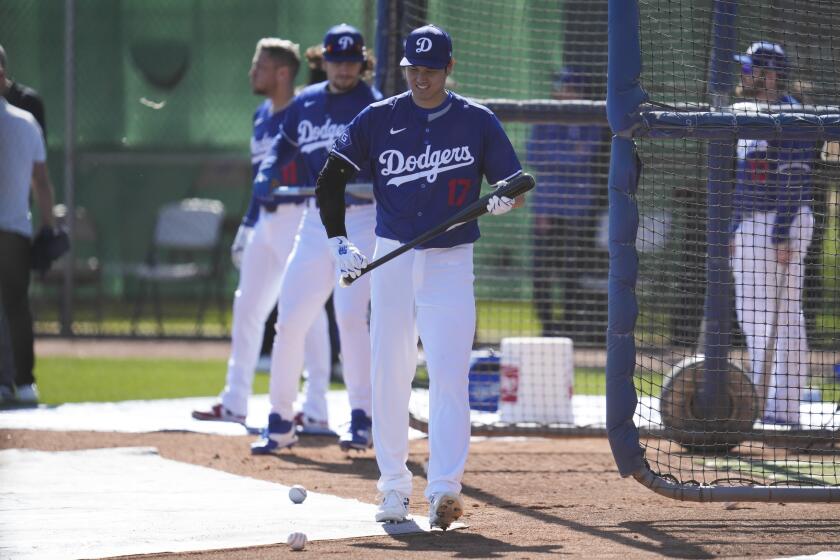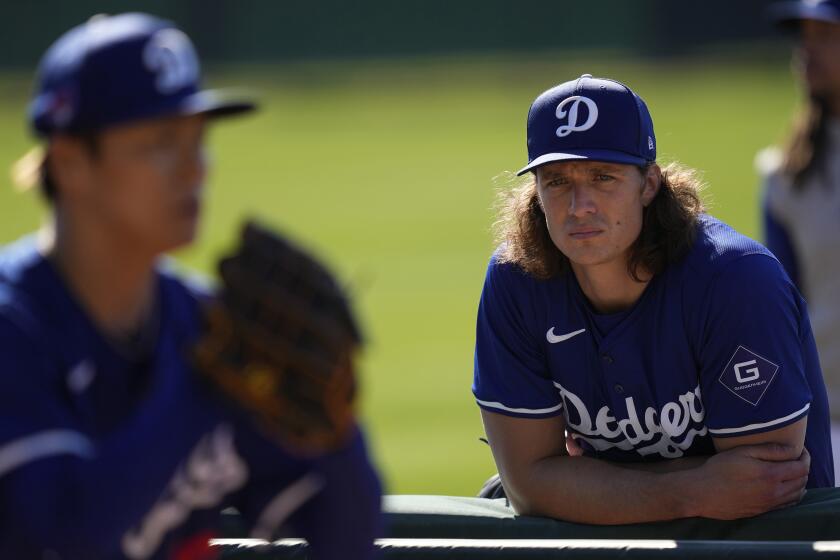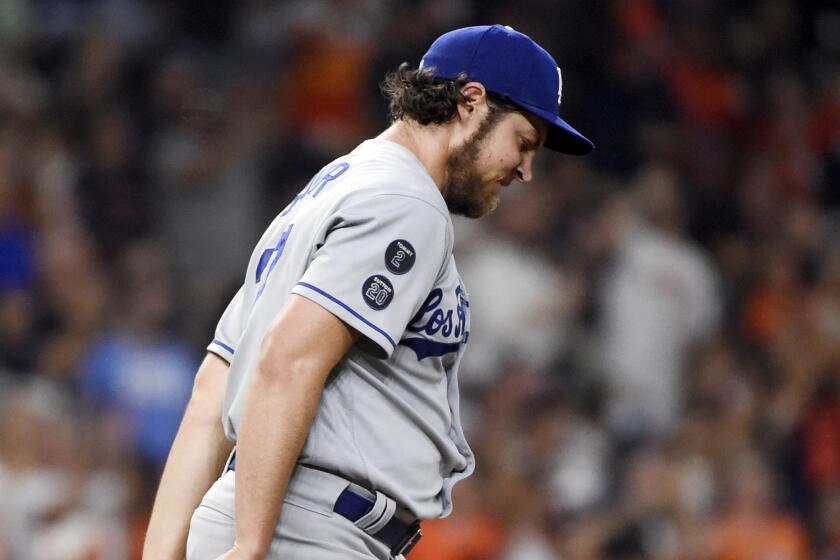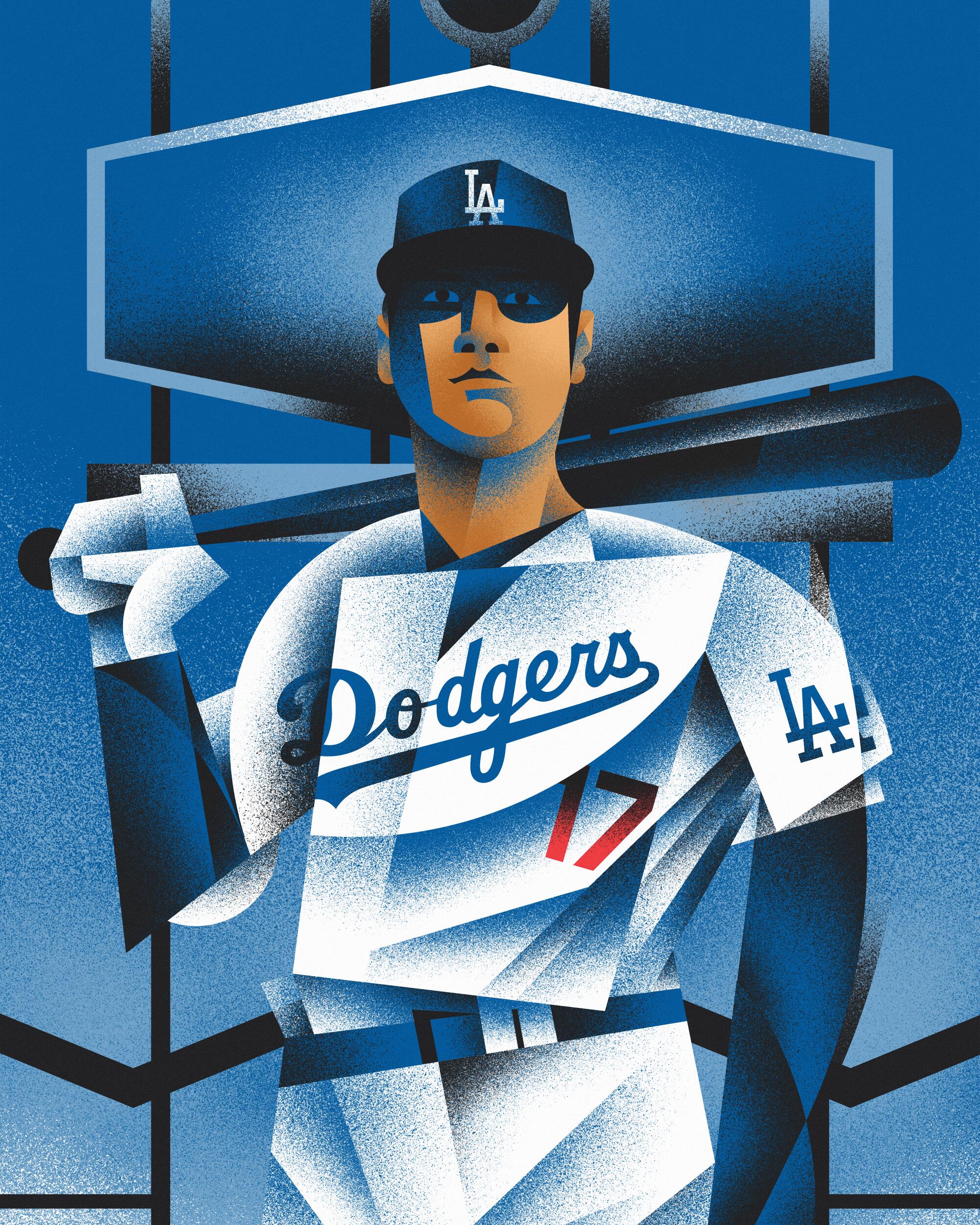
You got him.
That was the message that Shohei Ohtani’s agent, Nez Balelo, delivered to the Dodgers’ president of baseball operations, Andrew Friedman, right around noon Pacific time on Dec. 9.
Three little words to end one of the biggest free-agent sagas in recent baseball history.
Three magic words likely to shape the next chapter of the Dodgers’ storied history.
For years, the Dodgers had dreamed of signing Ohtani, baseball’s first two-way star in roughly a century. For months this winter, they strategized ways to woo the two-time American League MVP to Chavez Ravine.
It all reached a head in early December, when a wave of online speculation and incorrect media reports — most of them centered on a private jet flight to Toronto — tested the Dodgers’ confidence, turning thoughts of missing out on Ohtani into a seemingly legitimate possibility.
Shohei Ohtani is no Muhammad Ali when it comes to talking about himself, but his standout play and his legions of fans have made him a social media star.
“It was like watching election returns,” team president Stan Kasten recalled. “You really don’t have any inside information, so you’re just sitting at home watching on TV, following on Twitter or X. Because we didn’t know any different.”
Finally, on the Saturday afternoon following the league’s annual winter meetings — and the day after Ohtani-to-Toronto rumors reached their peak — Balelo was ready to inform the Dodgers of his client’s actual decision.
The agent called Friedman, who was sitting in his car at an Orange County soccer field where his son was playing in a youth tournament.
Friedman quickly answered, taking Balelo’s call just as he wrapped up a Zoom meeting on his iPad with another player the Dodgers were pursuing.
“I think [it’s about Ohtani’s decision], but I’m not sure,” Friedman recalled recently, sitting in his office at the Dodgers’ Camelback Ranch spring training facility. “So I get off the Zoom. Put my iPad away. And I answer as I open the car door and am walking out to the field.”
Three words later, everything changed.
“You got him,” Balelo informed Friedman.
“Excuse me?” Friedman responded.
“You got him,” Balelo reiterated. “Shohei is a Dodger.”
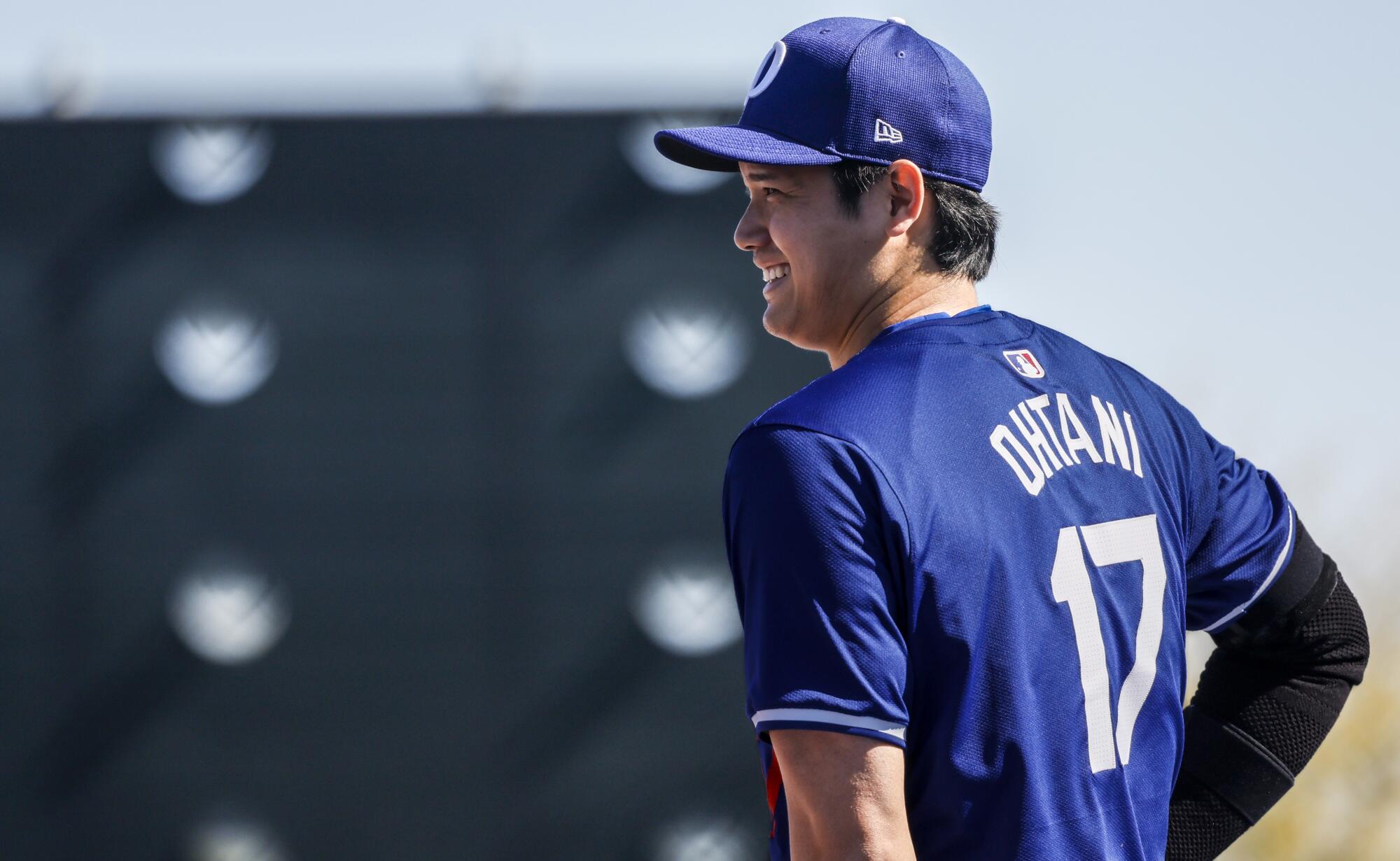
In the three months since that day, the franchise has quickly learned all that reality entails.
The Dodgers knew signing Ohtani would expand interest in the club exponentially. They knew it would attract an influx of international media, casual fans in their home market and attention from every other corner of the baseball world in between.
But what they couldn’t have imagined, even in their most fanciful dreams, is how intensely Ohtani’s presence would drive buzz over the course of the offseason — or just how beloved he’d be to his new fan base before even playing his first regular-season game.
“It has transcended anything that came before,” Kasten said of the fan response Ohtani has received so far, and the spectacle his arrival has created for the franchise. “And yes, it has transcended even our rosiest projections.”
When Mark Langill thinks of the most iconic Dodgers of all time, the club’s official team historian thinks of a commonly shared, difficult-to-define but singularly recognizable trait.
“The one word that comes to mind is mystique,” Langill said. “There’s only a couple players I can think of that would have that type of mystique.”
Jackie Robinson had it, of course, not only for breaking Major League Baseball’s color barrier with the Brooklyn Dodgers but also for his seven All-Star appearances, 1949 MVP Award and veteran role on the club’s first World Series-winning team in 1955.
Sandy Koufax did too, emerging as the preeminent figure of the team’s early Los Angeles years with his three Cy Young Awards, five ERA titles and four World Series rings before an early retirement at age 30.
“‘You only get one Koufax in your lifetime,’” Langill recalled the late, legendary broadcaster Vin Scully saying. “That always struck me, in terms of how he put Sandy in a special category.”
Plenty of other celebrated names have achieved similar superstar status at Chavez Ravine since then, from Hall of Fame pitchers Don Drysdale and Don Sutton to heroes of the 1980s such as Orel Hershiser and, perhaps most notably, Fernando Valenzuela.
Clayton Kershaw has taken up that mantle for the most recent generation of Dodgers fans, serving as a cornerstone piece for one World Series and an unprecedented decade-long run of regular-season success.
And now, only three months removed from his signing, Ohtani is already showing signs of possessing the same potential, animating the fan base in ways that extend well beyond his talents on the field.
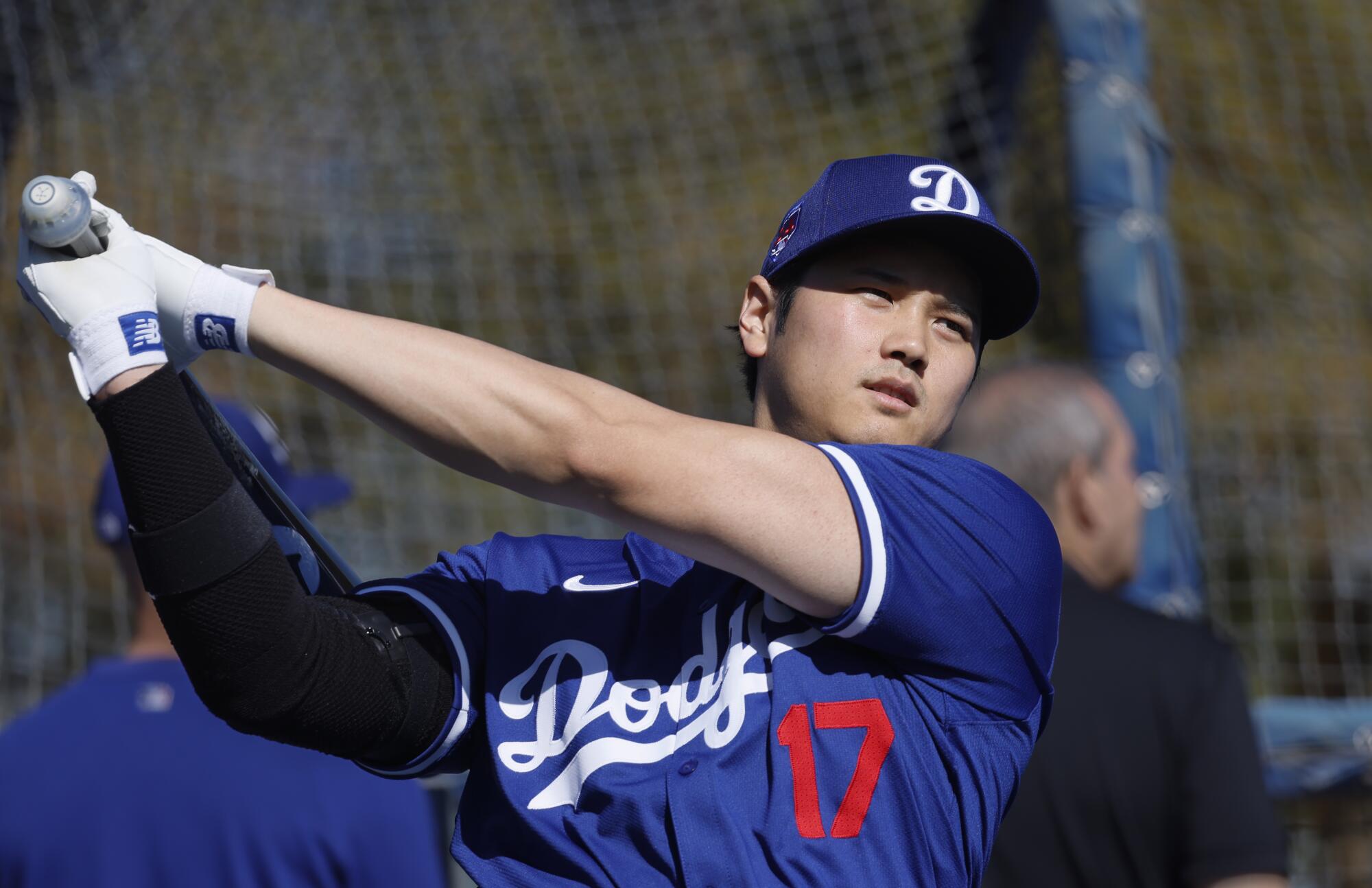
“When he walks into a room, there’s a presence. Like, ‘That’s Shohei.’”
— Dino Ebel, Dodgers third base coach
“I think that’s what we’re seeing now,” Langill said. “Everybody has a different description of [why they’re drawn to him]. Everybody is excited, but for different reasons. ... That’s why I think of that word ‘mystique.’ It’s just something you can’t define.”
Indeed, ask around the Dodgers organization about the early impact of Ohtani’s presence, and answers will vary widely.
Players have marveled at the international attention the 29-year-old attracts, felt most acutely by the masses of global press members — most of them Japanese — who have descended upon their Camelback Ranch facility in Arizona this spring.
“When you bring in the Japanese culture, how much they love baseball, and just from talking to other people about how much he means to their country,” Kershaw said, “it’s pretty amazing.”
“I definitely think there is that mystique, that aura that follows him being the international superstar he is,” closer Evan Phillips added. “I think that’s where a lot of the extra attention comes from.”
Other members of the organization have noted the overwhelming crowds for spring training practices at the Camelback Ranch complex, where the sight of Ohtani simply walking from one backfield to another has sent patrons sprinting for a glimpse of the $700-million signing.
“When he walks into a room,” said third base coach Dino Ebel, who previously crossed paths with Ohtani during his rookie year with the Angels, “there’s a presence. Like, ‘That’s Shohei.’”
The Dodgers’ merchandise and marketing departments might have the best insights into the player’s instant popularity.
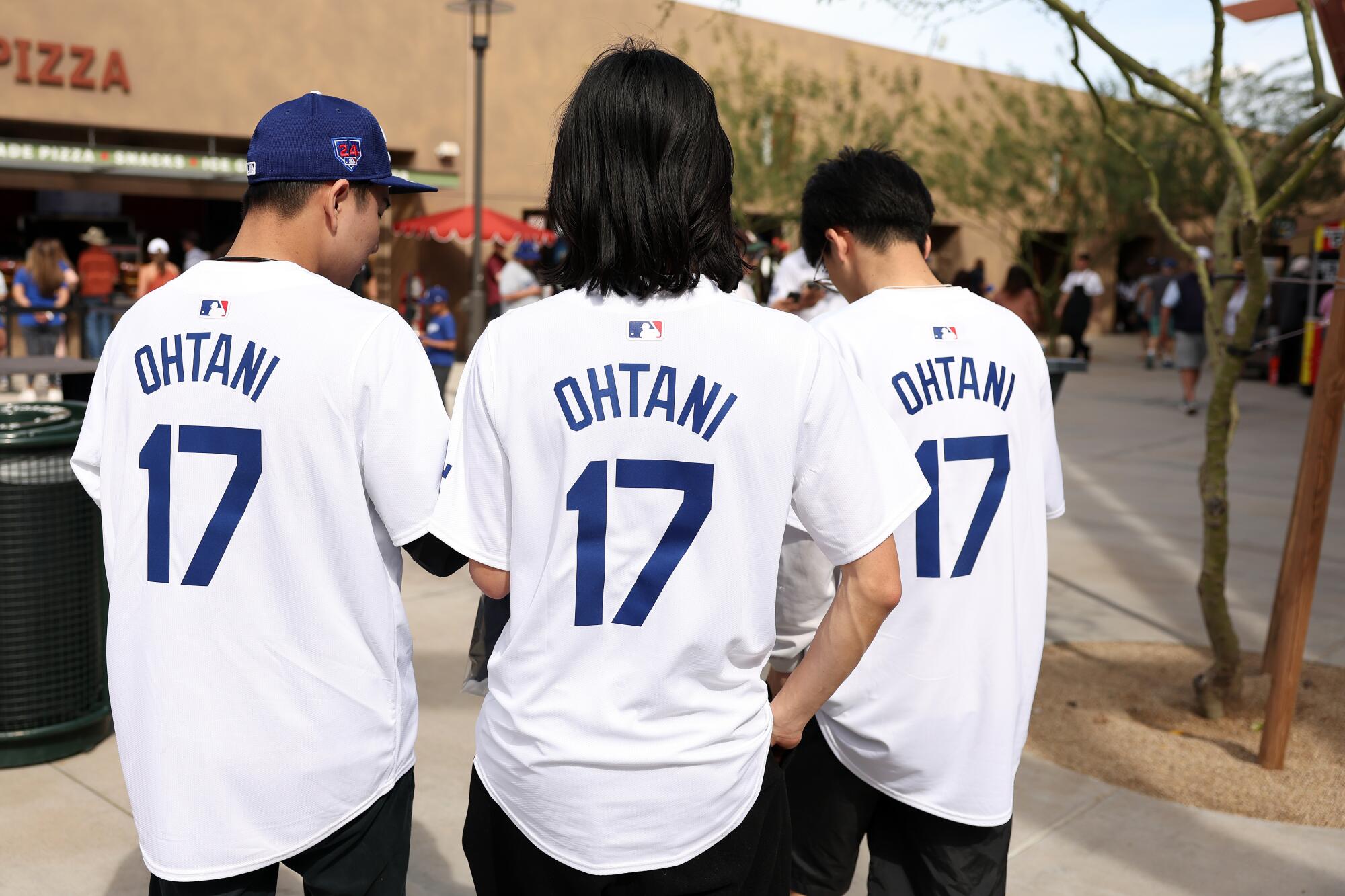
According to Kasten, there has been a “run” on Ohtani gear at the club’s in-stadium team store, both from local fans eager to get a No. 17 jersey or T-shirt as well as from a wave of Japanese tour groups that have visited the ballpark since Ohtani’s signing.
Online sales have also been so robust, Kasten said the league’s merchandise manufacturer, Fanatics, has been “challenged” trying to “keep up with our demand.”
“We think we have enough [merchandise] to get through the early part of the season,” Kasten said. “But we need to reload as fast as they can do it. ... It’s just so much.”
Ohtani’s presence has had a similar impact on ticket sales. Prices for the Dodgers’ March 28 home opener skyrocketed on secondary markets following the two-time MVP’s December signing. Tickets for Ohtani-related promotional nights, such as a bobblehead giveaway in May, have also spiked in cost.
“There are very, very few players in all of sports who literally drive ticket sales on their own,” Kasten said. “Jordan was one. LeBron. Maybe some quarterbacks. ... But I think Shohei has that extra dimension, where people will come out just to see him personally. And that is extremely rare.”
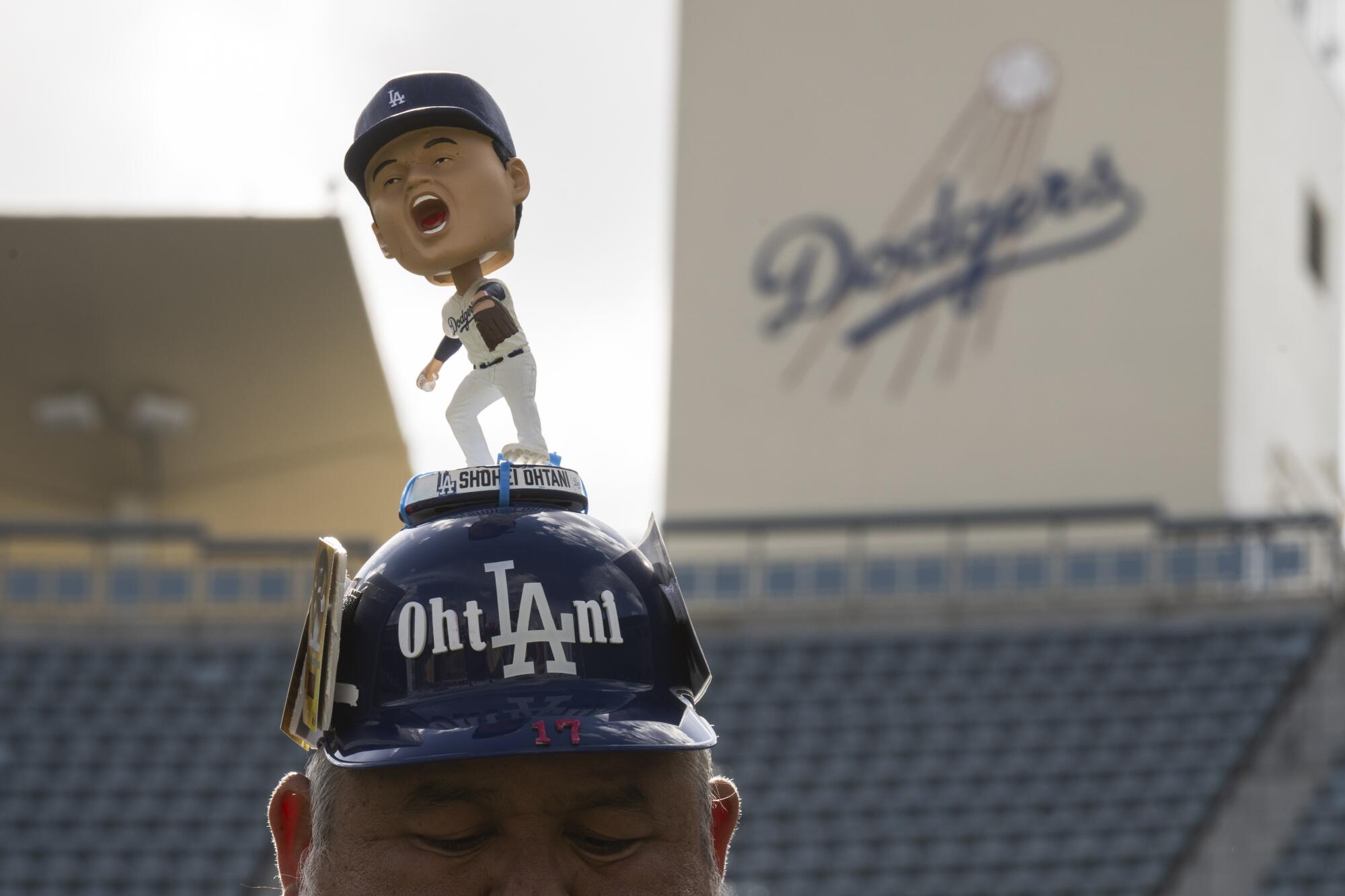
To Langill, each of those extra dimensions is what make the interest level surrounding Ohtani unique.
He can have the on-field impact of Mookie Betts and Freddie Freeman, the Dodgers’ most recent star acquisitions before Ohtani.
His reserved demeanor and private personal life — epitomized by the shock of his unexpected marriage announcement this spring — give him the “curiosity factor” of a Koufax or Kershaw.
Yet, his celebrity profile could also cause a stir reminiscent of Fernando-mania in 1981, or the craze that accompanied Manny Ramirez’s arrival in 2008 — when a stadium that “before didn’t sell personalized jerseys and things,” according to Langill, renamed a section of the ballpark “Mannywood” and started selling Manny wigs to an enamored fan base.
“The history book of the Dodgers is already filled to the brim with so many things,” Langill said. “But this chapter [with Ohtani], I think so many people are excited about because you just don’t know what’s going to happen. It’s the great unknown.”
To Friedman, Ohtani’s first three months with the team have mostly felt like one big blur.
As soon as Balelo delivered the news on that Saturday afternoon in December, Friedman had just minutes to alert Kasten, owner Mark Walter and the rest of his front office before Ohtani made the announcement publicly on Instagram.
In the days and weeks that followed, there were introductions to make, news conferences to organize, and other marquee players — including fellow Japanese star Yoshinobu Yamamoto, whose recruitment included an in-person meeting in which Ohtani took part — the team needed to add around him.
“It prevented me from feeling the elation of [the signing],” Friedman recalled. “I’m not sure it ever really set in.”
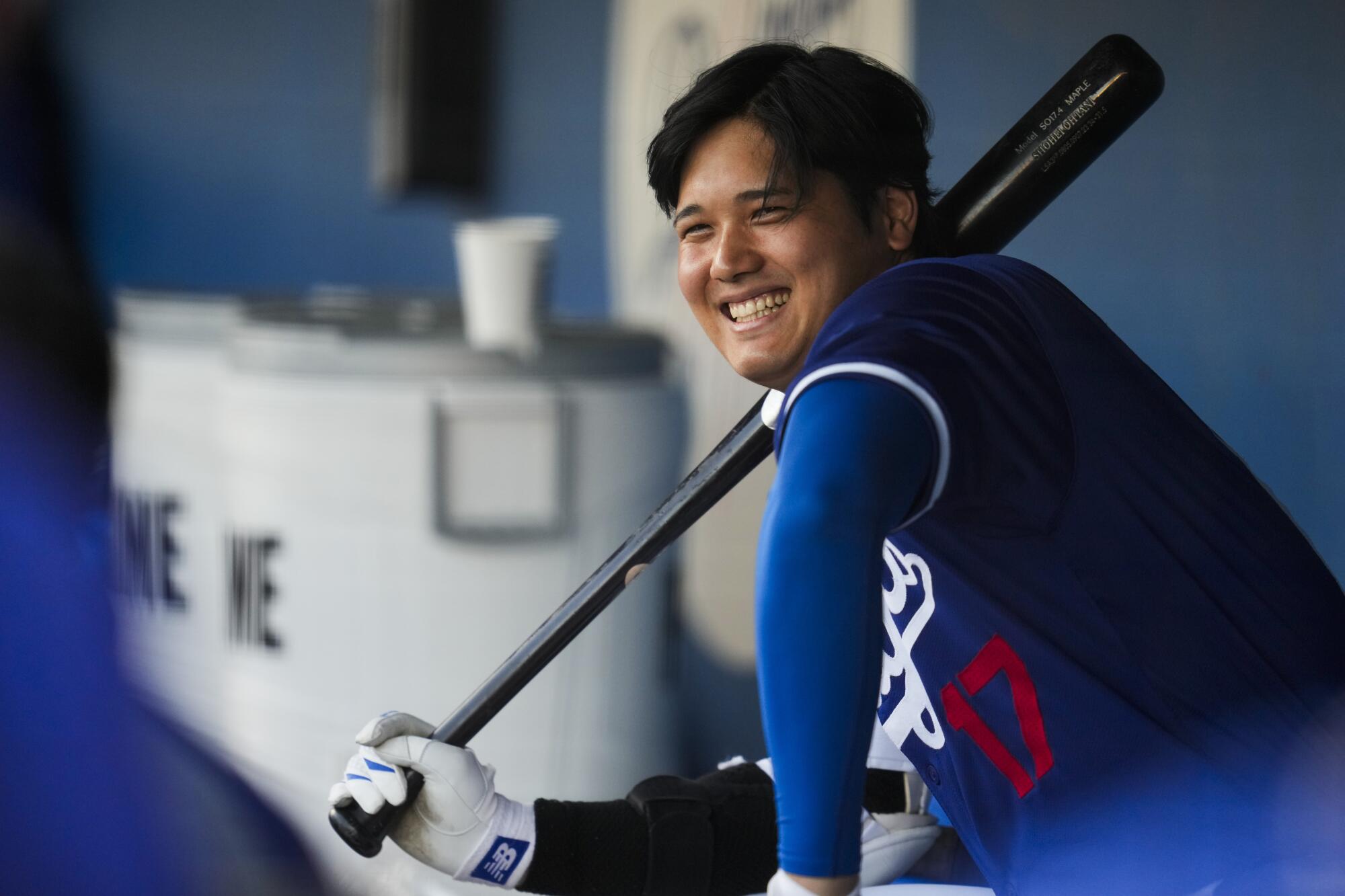
That remained the case through much of the winter. The sight of Ohtani around Dodger Stadium (where he worked out during the winter) and Camelback Ranch still seemed strange to Friedman. The fact he was under contract with the team for the next 10 years — barring Friedman or Walter leaving the franchise, at which point the two-way star could opt out of his deal — still didn’t feel real.
“It was just like he was visiting,” Friedman said. “It just hadn’t quite hit me.”
That finally changed once Ohtani played his first Cactus League game.
That day, on a sunny Tuesday afternoon last month, No. 17 jerseys filled the concourses (outnumbered only by fans with “Kershaw,” “Freeman,” or “Betts” displayed across their backs). A lively weekday crowd serenaded the new designated hitter with ovations and cheers.
The Dodgers’ Kiké Hernández struggled for two seasons before Dr. William Meyers discovered he suffered from not one but two sports hernias.
Then, in his third at-bat, Ohtani launched an opposite-field home run as Friedman and Co. looked on, eliciting regular-season-level reactions from the stands.
“Until then,” Friedman said, “I hadn’t fully appreciated that Shohei was a Dodger.”
Now, it’s impossible to imagine the franchise’s future without him — on the field and beyond.
“I’ve said this a couple times, but our goal is for this period of time to be looked back on as the golden era of Dodger baseball,” Friedman said. “That is an incredibly high bar. But obviously, signing Shohei, and what that potentially means as we look out, definitely increases the chances of that.”
More to Read
Are you a true-blue fan?
Get our Dodgers Dugout newsletter for insights, news and much more.
You may occasionally receive promotional content from the Los Angeles Times.


